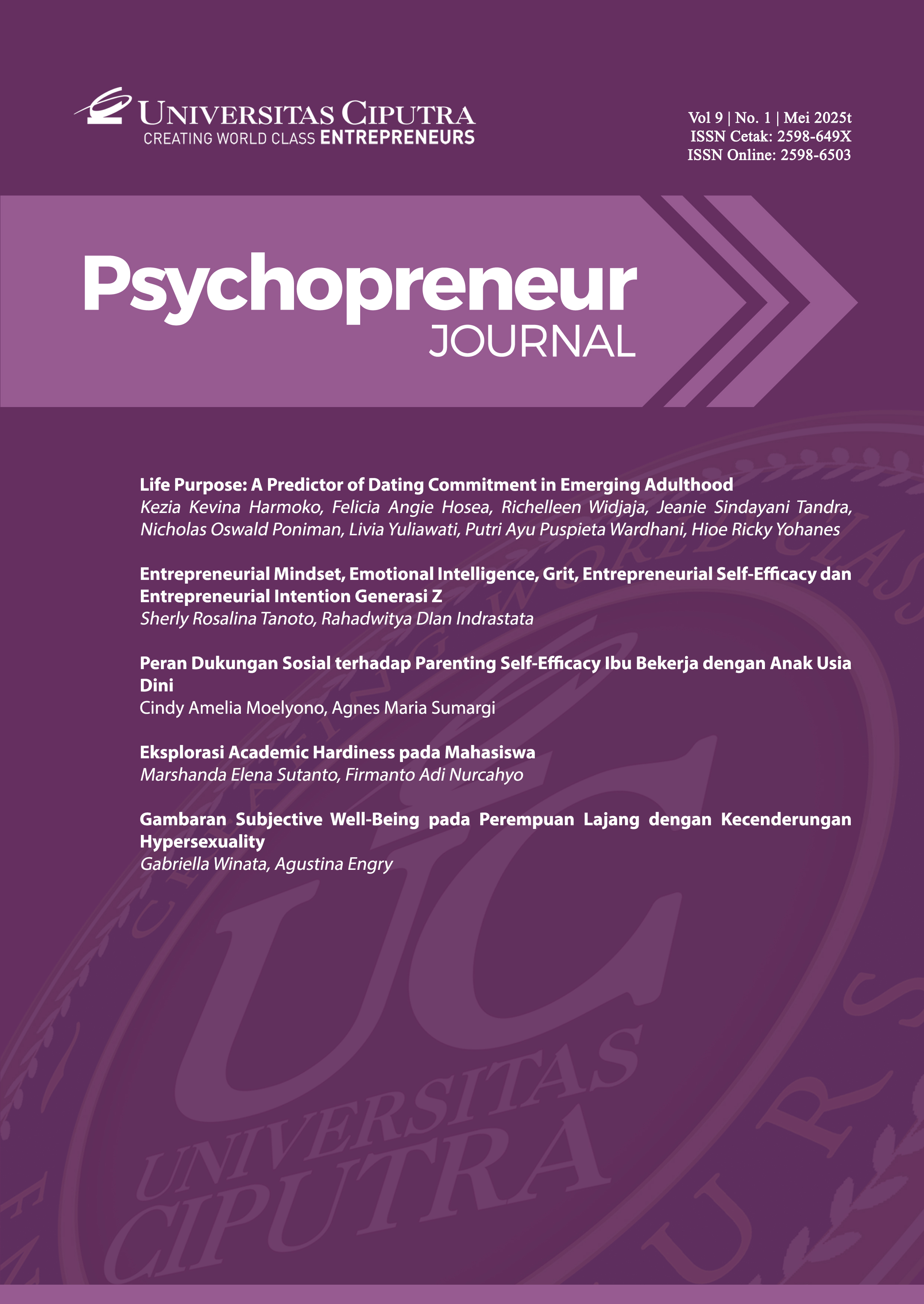Peran Dukungan Sosial terhadap Parenting Self-Efficacy Ibu Bekerja dengan Anak Usia Dini
Main Article Content
Abstract
Working mothers of young children face a constant challenge. Their limited time can impact their ability to parent effectively, while young children still require support in managing emotions and behavior. This situation can lead to a decrease in parenting self-efficacy. This study aimed to examine one of the factors that influence parenting self-efficacy, namely social support. Participants were 124 full-time working mothers, aged 20-30 years, with a first child aged 2-6 years, and living in East Java. The mothers completed online parenting self-efficacy and social support questionnaire. A regression analysis revealed a significant influence of social support on parenting-self efficacy with an effective contribution of 26.3%. Support from family, friends, and significant others all play a role in increasing parenting self-efficacy of working mothers with young children.
Article Details

This work is licensed under a Creative Commons Attribution-ShareAlike 4.0 International License.

This work is licensed under a Creative Commons Attribution-ShareAlike 4.0 International License.
References
Arfianto, M. A., Mustikasari, M., & Wardani, I. Y. (2020). Apakah dukungan sosial berhubungan dengan kesejahteraan psikologis ibu pekerja? Jurnal Keperawatan Jiwa (JKJ): Persatuan Perawat Nasional Indonesia, 8(4), 505–514.
Atikah, C. (2023). Karakteristik perkembangan anak usia dini. Khazanah Pendidikan, 17(1), 75–81. https://doi.org/10.30595/jkp.v17i1.15397
Benedetto, L., & Ingrassia, M. (2018). Parental self-efficacy in promoting children care and parenting quality. In L. Bernedetto & M. Ingrassia (Eds.), Parenting-empirical advances and intervention resources (pp. 31–57). IntechOpen. https://doi.org/10.5772/63688
De Sousa Machado, T., Chur-Hansen, A., & Due, C. (2020). First-time mothers’ perceptions of social support: Recommendations for best practice. Health Psychology Open, 7(1), 1–10. https://doi.org/10.1177/2055102919898611
Eynde, A. van den, Claessens, E., & Mortelmans, D. (2020). The consequences of work-family conflict in families on the behavior of the child. JFR-Journal of Family Research, 32(1), 123–144. https://doi.org/10.20377/jfr-355
Fajriyati, Y. N., Lestari, S., & Hertinjung, W. S. (2023). Pengalaman ibu bekerja yang memiliki anak balita dalam mencapai keseimbangan kerja-keluarga. Jurnal Psikologi Ulayat, 10(1), 59–78. https://doi.org/10.24854/jpu477
Fang, Y., Boelens, M., Windhorst, D. A., Raat, H., & van Grieken, A. (2021). Factors associated with parenting self‐efficacy: A systematic review. Journal of Advanced Nursing, 77(6), 2641–2661. https://doi.org/10.1111/jan.14767
Field, A. (2013). Discovering statistics using IBM SPSS statistics. Sage Publications Ltd.
Holtz, B., Smock, A., & Reyes-Gastelum, D. (2015). Connected motherhood: social support for moms and moms-to-be on Facebook. Telemedicine and E-Health, 21(5), 415–421. https://doi.org/10.1089/tmj.2014.0118
Hong, X., & Liu, Q. (2021). Parenting stress, social support and parenting self-efficacy in Chinese families: Does the number of children matter? Early Child Development and Care, 191(14), 2269–2280. https://doi.org/10.1080/03004430.2019.1702036
Jones, T. L., & Prinz, R. J. (2005). Potential roles of parental self-efficacy in parent and child adjustment: A review. Clinical Psychology Review, 25(3), 341–363. https://doi.org/10.1016/j.cpr.2004.12.004
Leahy‐Warren, P., McCarthy, G., & Corcoran, P. (2012). First‐time mothers: social support, maternal parental self‐efficacy and postnatal depression. Journal of Clinical Nursing, 21(3‐4), 388–397.
Maclean, E. I., Andrew, B., & Eivers, A. (2021). The motherload: Predicting experiences of work-interfering-with-family guilt in working mothers. Journal of Child and Family Studies, 30, 169–181. https://doi.org/10.1007/s10826-020-01852-9
Morawska, A., Sanders, M. R., Haslam, D., Filus, A., & Fletcher, R. (2014). Child adjustment and parent efficacy scale: Development and initial validation of a parent report measure. Australian Psychologist, 49(4), 241–252. https://doi.org/https://doi.org/10.1111/ap.12057
Porter, C. L., & Hsu, H.-C. (2003). First-time mothers’ perceptions of efficacy during the transition to motherhood: links to infant temperament. Journal of Family Psychology, 17(1), 54. https://doi.org/10.1037/0893-3200.17.1.54
Pramudianti, D. N. (2017). Hubungan antara dukungan sosial dengan parenting self-efficacy pada periode awal postpartum di Bidan praktik mandiri (Bpm) Gunarti, Banjarbaru. Journal of Midwifery and Reproduction, 1(1), 15–20. https://doi.org/10.35747/jmr.v1i1.86
Raharjo, Y. O., & Sumargi, A. M. (2018). Dukungan sosial dan kepuasan hidup pada mahasiswa Universitas Katolik Widya Mandala Surabaya yang berasal dari luar Jawa. Experientia, Jurnal Psikologi Indonesia, 6(1), 1–10. https://doi.org/https://doi.org/10.33508/exp.v6i1.1785
Rajgariah, R., Malenahalli Chandrashekarappa, S., Venkatesh Babu, D. K., Gopi, A., Murthy Mysore Ramaiha, N., & Kumar, J. (2021).
Parenting stress and coping strategies adopted among working and non-working mothers and its association with socio-demographic variables: A cross-sectional study. Clinical Epidemiology and Global Health, 9, 191–195. https://doi.org/10.1016/j.cegh.2020.08.013
Santrock, J. W. (2013). Life-span development (Fourteenth). McGraw-Hill Companies.
Sari, D. R., & Rasyidah, A. Z. (2019). Peran orang tua pada kemandirian anak usia dini. Early Childhood: Jurnal Pendidikan, 3(1), 45–57. https://doi.org/10.35568/earlychildhood.v3i1.441
Sumargi, A., Filus, A., Morawska, A., & Sofronoff, K. (2018). The Parenting and Family Adjustment Scales (PAFAS): An Indonesian validation study. Journal of Child and Family Studies, 27(3), 756–770. https://doi.org/10.1007/s10826-017-0926-y
Sumargi, A., Sofronoff, K., & Morawska, A. (2015). Understanding parenting practices and parents’ views of parenting programs: A survey among Indonesian parents residing in Indonesia and Australia. Journal of Child and Family Studies, 24(1), 141–160. https://doi.org/10.1007/s10826-013
Surahman, B. (2019). Peran ibu terhadap masa depan anak. Jurnal Hawa: Studi Pengarus Utamaan Gender Dan Anak, 1(2), 1–9.
Suzuki, S. (2010). The effects of marital support, social network support, and parenting stress on parenting: Self-efficacy among mothers of young children in Japan. Journal of Early Childhood Research, 8(1), 40–66. https://doi.org/10.1177/1476718X09345506
Utami, K. P., & Wijaya, Y. D. (2018). Hubungan dukungan sosial pasangan dengan konflik pekerjaan-keluarga pada ibu bekerja. Jurnal Psikologi: Media Ilmiah Psikologi, 16(1), 1–8. https://doi.org/10.47007/jpsi.v16i1.24
Wittkowski, A., Garrett, C., Calam, R., & Weisberg, D. (2017). Self-report measures of parental self-efficacy: A systematic review of the current literature. Journal of Child and Family Studies, 26, 2960–2978. https://doi.org/10.1007/s10826-017-0830-5
Zimet, G. D., Powell, S. S., Farley, G. K., Werkman, S., & Berkoff, K. A. (1990). Psychometric characteristics of the multidimensional scale of perceived social support. Journal of Personality Assessment, 55(3–4), 610–617. https://doi.org/https://doi.org/10.1080/00223891.1990.9674095



